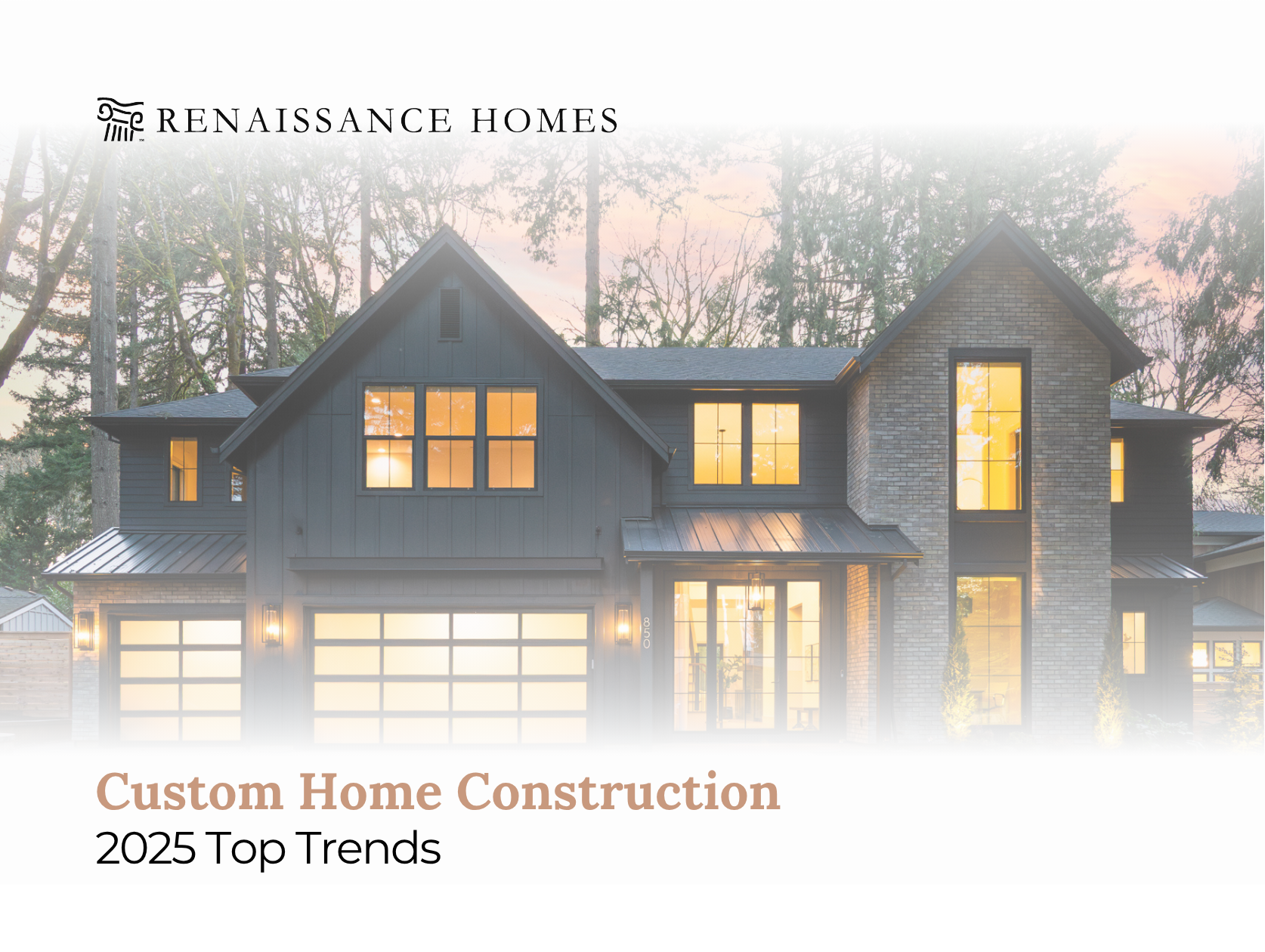The world of custom home construction continues to evolve at an unprecedented pace, with 2025 marking a pivotal year for innovative design, sustainable building practices, and cutting-edge technology integration. As homeowners seek residences that reflect their unique lifestyles while embracing modern conveniences, the industry has responded with transformative trends that redefine luxury living.
Whether you’re planning to build your dream home or exploring options for future investment, understanding these emerging trends will help you make informed decisions that align with both current market demands and your personal vision. From wellness-focused spaces to smart home ecosystems, the landscape of residential construction has never been more exciting or diverse.
The Rise of Wellness-Centered Design
Health-Conscious Living Spaces
Modern homeowners increasingly prioritize health and wellness in their living environments, driving a significant shift in how architects and builders approach new construction custom homes. This trend extends far beyond traditional considerations like natural light and ventilation to encompass comprehensive wellness systems that actively promote physical and mental well-being.
Today’s wellness-centered homes feature advanced air purification systems, circadian lighting that adjusts throughout the day to support natural sleep patterns, and dedicated spaces for meditation, exercise, and relaxation. These elements work together to create environments that nurture both body and mind, transforming homes into personal sanctuaries that support optimal health.
Biophilic Design Integration
The connection between indoor and outdoor living has become a cornerstone of contemporary custom home construction plans. Biophilic design principles bring nature into the home through strategic use of natural materials, living walls, indoor gardens, and expansive windows that blur the boundaries between interior and exterior spaces.
This approach goes beyond aesthetic appeal to deliver proven psychological and physiological benefits. Research shows that incorporating natural elements into living spaces can reduce stress, improve cognitive function, and enhance overall well-being. Forward-thinking homeowners are investing in features like indoor water features, natural stone accents, and organic shapes that echo patterns found in nature.
Sustainable Building Practices and Materials
Net-Zero Energy Homes
The push toward environmental responsibility has made net-zero energy homes one of the most significant trends in construction custom homes. These residences produce as much energy as they consume through a combination of energy-efficient design, advanced insulation techniques, and renewable energy systems.
Solar panels have evolved from bulky additions to seamlessly integrated building components, with solar roof tiles that maintain aesthetic appeal while generating clean energy. Combined with battery storage systems and smart energy management, these homes offer both environmental benefits and long-term cost savings that make them increasingly attractive to eco-conscious buyers.
Innovative Eco-Friendly Materials
The materials used in luxury custom home construction have undergone a revolution, with sustainable options now offering superior performance alongside environmental benefits. Recycled steel framing, bamboo flooring, reclaimed wood, and low-VOC paints have become standard choices for environmentally conscious builders.
New innovations include carbon-negative concrete alternatives, mushroom-based insulation, and thermally efficient windows that dramatically reduce energy consumption. These materials not only minimize environmental impact but often provide better durability and performance than traditional options, making them a smart choice for long-term value.
Smart Home Technology Integration
Comprehensive Home Automation
The integration of smart home technology has moved beyond novelty to become an essential component of modern custom home construction. Today’s systems offer seamless control of lighting, climate, security, and entertainment through intuitive interfaces that learn and adapt to homeowners’ preferences.
Voice-activated assistants, automated window treatments, and intelligent climate control systems work together to create homes that anticipate and respond to residents’ needs. These technologies not only enhance convenience but also contribute to energy efficiency by optimizing resource usage based on occupancy patterns and environmental conditions.
Advanced Security and Privacy Features
As our lives become increasingly connected, security and privacy have emerged as top priorities in custom home construction plans. Modern security systems go beyond traditional alarms to include facial recognition entry systems, perimeter monitoring with AI-powered threat detection, and cybersecurity measures that protect smart home networks.
Privacy considerations extend to architectural design, with homes featuring strategic landscaping, smart glass that can switch from transparent to opaque, and acoustic treatments that ensure conversations remain private. These features provide peace of mind while maintaining the open, welcoming atmosphere that defines contemporary luxury living.
Flexible and Multi-Functional Spaces
Adaptive Room Design
The events of recent years have fundamentally changed how we use our homes, leading to increased demand for flexible spaces that can adapt to changing needs. Modern custom home construction emphasizes rooms that can seamlessly transition between different functions throughout the day or as family needs evolve.
Moveable walls, convertible furniture systems, and modular design elements allow homeowners to reconfigure spaces as needed. A home office can transform into a guest room, a playroom can evolve into a teen hangout, and entertainment spaces can accommodate both intimate gatherings and large celebrations. Learn more about versatile floor plans.
Dedicated Work-From-Home Spaces
The permanent shift toward remote work has made dedicated home offices essential rather than optional. Today’s home offices go beyond simple desk spaces to include professional-quality video conferencing setups, soundproofing, separate entrances for client meetings, and ergonomic design that supports productivity and well-being.
Many new construction custom homes now feature multiple work zones to accommodate households where several family members work or study from home. These spaces are designed with proper lighting, ventilation, and technology infrastructure to support professional activities while maintaining clear boundaries between work and personal life.
Outdoor Living Excellence
Resort-Style Outdoor Amenities
The concept of outdoor living has evolved dramatically, with homeowners investing in exterior spaces that rival the finest resorts. Modern luxury custom home construction includes features like outdoor kitchens with professional-grade appliances, climate-controlled dining pavilions, and entertainment systems designed for year-round use.
Swimming pools have become architectural statements featuring infinity edges, natural swimming pools with biological filtration, and integrated spa areas. Fire features, water elements, and sophisticated lighting systems create ambiance while extending the usability of outdoor spaces well into the evening hours.
Sustainable Landscaping
Landscape design has become an integral part of the overall custom home construction contractor planning process, with emphasis on native plants, water-efficient irrigation systems, and designs that support local ecosystems. Rain gardens, permeable paving, and strategic grading help manage stormwater naturally while creating beautiful outdoor environments.
These sustainable approaches to landscaping reduce maintenance requirements and water usage while creating habitats for beneficial wildlife. The result is outdoor spaces that are both beautiful and environmentally responsible, enhancing property values while contributing to neighborhood ecosystems.
Aging-in-Place Design Features
Universal Design Principles
As demographics shift and multi-generational living becomes more common, incorporating aging-in-place features into custom home construction cost considerations has become increasingly important. Universal design principles ensure homes remain comfortable and accessible for residents throughout all life stages.
Features like zero-threshold entries, wider doorways and hallways, and bathrooms designed to accommodate mobility aids are being seamlessly integrated into luxury home designs. These elements are implemented in ways that enhance rather than detract from aesthetic appeal, ensuring homes remain both beautiful and functional for decades to come.
Technology for Independent Living
Smart home technology plays a crucial role in supporting aging-in-place, with systems that can monitor health metrics, provide medication reminders, and enable easy communication with family members or healthcare providers. Voice-controlled systems eliminate the need for complex interfaces, while automated lighting and climate control enhance safety and comfort.
These technologies are designed to be unobtrusive and user-friendly, providing support without creating an institutional feel. The goal is to enable residents to maintain independence and quality of life while ensuring help is readily available when needed.
Luxury Amenities and Personal Wellness
Home Spa and Wellness Centers
The trend toward personal wellness has elevated home spas from simple bathroom upgrades to comprehensive wellness centers. Today’s luxury homes feature dedicated spa areas with steam rooms, saunas, cold plunge pools, and massage rooms designed to rival professional facilities.
These spaces often include advanced features like chromotherapy lighting, aromatherapy systems, and hydrotherapy options that provide therapeutic benefits. Combined with exercise facilities and meditation spaces, they create complete wellness environments that support physical and mental health without leaving home.
Entertainment and Recreation Spaces
Modern custom home construction plans increasingly include sophisticated entertainment spaces that go beyond traditional media rooms. Home theaters with acoustic treatments and professional-grade projection systems, gaming lounges with VR capabilities, and wine cellars with tasting rooms reflect the diverse interests of today’s homeowners.
Key features gaining popularity in 2025 include:
- Professional-grade home recording studios with soundproofing
- Indoor sports courts for basketball, pickleball, or rock climbing
- Hobby spaces designed for specific interests like art, crafts, or collecting
- Multi-purpose recreation rooms that accommodate various activities
Energy Efficiency and Climate Resilience
Advanced Building Envelope Systems
The building envelope, which separates indoor and outdoor environments, has become a focal point for innovation in custom home construction. Advanced insulation materials, high-performance windows, and sophisticated air sealing techniques work together to create homes that maintain comfortable temperatures with minimal energy input.
These systems not only reduce energy costs but also enhance comfort by eliminating drafts and temperature variations. Combined with energy recovery ventilation systems, they ensure excellent indoor air quality while minimizing energy loss, creating homes that are both efficient and healthy.
Climate-Adaptive Design
As weather patterns become more extreme, climate resilience has emerged as a critical consideration in construction custom homes. Designs now incorporate features like reinforced structures to withstand high winds, elevated foundations in flood-prone areas, and fire-resistant materials in wildfire zones.
Beyond protection from extreme events, climate-adaptive design includes passive cooling strategies, natural ventilation systems, and strategic orientation to minimize heat gain. These approaches ensure homes remain comfortable and safe regardless of changing environmental conditions.
Personalization and Craftsmanship
Artisan Details and Custom Finishes
While technology drives many current trends, there’s also a renewed appreciation for artisan craftsmanship and unique details that give homes distinctive character. Custom millwork, hand-forged metalwork, and bespoke tile designs allow homeowners to express their personal style while supporting skilled craftspeople.
This trend extends to the integration of personal collections and artwork into architectural design, with custom display areas, lighting systems designed to showcase specific pieces, and built-in storage solutions that protect valuable items while keeping them accessible for enjoyment.
Cultural and Regional Influences
Modern luxury custom home construction increasingly celebrates cultural heritage and regional architectural traditions while incorporating contemporary amenities. This approach creates homes that feel rooted in their location while meeting modern lifestyle needs.
From Pacific Northwest timber frame elements to Mediterranean-inspired courtyards, these design choices create homes with authentic character that stands the test of time. The key is balancing traditional elements with modern functionality to create spaces that honor the past while embracing the future.
Why Hire Renaissance Homes for Your Custom Home Project
Locally owned and operated for over four decades, Renaissance Homes stands as the region’s most trusted custom luxury home builder. Our commitment to excellence has earned us recognition as the most awarded builder in Street of Dreams history, a testament to our dedication to quality, innovation, and customer satisfaction. With premium products hand-selected by our award-winning design team, every custom home we build reflects an unwavering commitment to craftsmanship and attention to detail.
As the best custom luxury home builder in the region, we transform dreams into reality through a seamless building process that prioritizes your unique vision. Our experienced team understands that building a custom home represents one of life’s most significant investments, and we approach each project with the care and expertise it deserves. From initial concept through final walkthrough, we ensure every aspect of your home exceeds expectations.
When you choose Renaissance Homes for your custom home construction contractor needs, you’re not just building a house; you’re creating a work of art that celebrates superior craftsmanship and personalized design. Our proven track record, combined with our deep understanding of local building requirements and market trends, positions us uniquely to deliver homes that are both beautiful and enduring investments in your family’s future.
Frequently Asked Questions
What factors most significantly impact custom home construction cost in 2025?
Custom home construction cost varies based on several key factors including lot location, home size, design complexity, material selections, and chosen amenities. Energy-efficient features and smart home technology may increase initial investment but typically provide long-term savings. Site conditions, such as slope or soil type, can also affect costs. Working with an experienced builder helps accurately estimate expenses and identify opportunities to maximize value within your budget.
How long does the custom home construction process typically take?
The timeline for building a custom home generally ranges from 10 to 16 months, though complex designs or unique features may extend this timeframe. The process includes design and permitting phases (2-4 months), site preparation and foundation work (1-2 months), framing and exterior completion (2-3 months), and interior finishing (3-4 months). Weather conditions, material availability, and change orders can impact the schedule. Established builders maintain strong supplier relationships to minimize delays.
What should I prioritize when reviewing custom home construction plans?
When evaluating construction plans, focus on how spaces will function for your daily life, ensuring rooms flow logically and accommodate your lifestyle needs. Consider long-term flexibility, energy efficiency, and storage solutions. Review natural light patterns, privacy between spaces, and outdoor connections. Verify that plans include adequate space for mechanical systems and future technology upgrades. Most importantly, ensure plans align with your budget while including must-have features.
How do I choose the right custom home construction contractor?
Selecting the right contractor involves researching their portfolio, reputation, and experience with projects similar to yours. Visit completed homes if possible and speak with past clients about their experiences. Verify licenses, insurance, and industry certifications. Look for builders who communicate clearly, provide detailed contracts, and have established processes for managing timelines and budgets. The best contractors offer comprehensive warranties and maintain relationships long after project completion.
What new construction custom homes features offer the best return on investment?
Energy-efficient features like superior insulation, high-performance windows, and solar systems typically provide excellent returns through reduced operating costs and increased resale value. Flexible spaces that can adapt to changing needs, quality kitchen and bathroom finishes, and smart home infrastructure also rank highly. Outdoor living spaces and primary suite amenities appeal to many buyers. However, the best investments balance personal enjoyment with market demands in your specific area.



